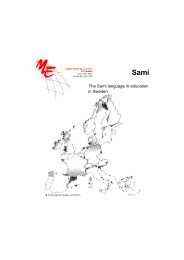Multilingual Early Language Transmission (MELT) - Mercator ...
Multilingual Early Language Transmission (MELT) - Mercator ...
Multilingual Early Language Transmission (MELT) - Mercator ...
You also want an ePaper? Increase the reach of your titles
YUMPU automatically turns print PDFs into web optimized ePapers that Google loves.
unfortunate that such rules exist. Such rules communicate a negative attitude towards<br />
children's home languages. Children may interiorize such negative attitudes and<br />
consequently stop speaking the home language altogether. Teachers should also realize that<br />
children under age 6 might not have the necessary cognitive maturity to be able to reflect on<br />
what language they are speaking to their friends at school and to be able to change their<br />
habits from home. Even for adult bilinguals it is exceedingly difficult and unnatural to speak<br />
another language X to someone they have always spoken language Y to. It is a good thing,<br />
then, that in Yann's school the teachers allowed him to speak Breton to children he speaks<br />
Breton to outside of school.<br />
As I said earlier, many people believe that early child bilingualism leads to all sorts of<br />
psychological problems and confusion. There is more and more scientific evidence, though,<br />
that children who hear two languages from early on are generally performing better on all<br />
sorts of tasks than children who hear just a single language. Also, the millions of bilingual<br />
children who perform well in each language and who are doing fine at school are evidence<br />
against the ill-founded idea that somehow, learning two languages early on is bad for you.<br />
Positive attitudes normally support bilingual development. In Yann's case, even though his<br />
preschool is monolingual, the teachers there have positive attitudes towards his bilingualism<br />
and towards the minority language, Breton. In Pelle's case there are similarly positive<br />
attitudes all around. Yet Pelle does not speak the minority language, Frisian. Obviously, for<br />
bilingual development to flourish additional factors play a role. These have to do with the<br />
language input, that is, with how often children hear each of their languages and in what<br />
circumstances.<br />
The role of language input<br />
The importance of frequent and regular language input<br />
In order to learn to speak a language children need to hear it a lot. Children cannot learn<br />
language from the air. Unfortunately, prominent linguists used to claim otherwise, but these<br />
claims were not founded on any real evidence. It is now very clear that if children do not<br />
hear a lot of a language they cannot learn it well enough.<br />
Parents may not be sufficiently aware of this. Many parents do not consider the importance<br />
of how much they talk to their children. They simply assume that children will talk in the<br />
language they speak to them. In a monolingual situation it doesn't matter all that much how<br />
often a particular person speaks to children - there will be plenty of other people speaking to<br />
them. In a bilingual setting where often only one or two people speak a particular language<br />
to children it becomes very important that these people speak that language a whole lot.<br />
In Pelle's case there are positive attitudes towards child bilingualism and towards both<br />
Frisian and Dutch. Yet Pelle does not speak Frisian. This is because Pelle simply does not hear<br />
enough Frisian and so doesn't have enough learning opportunities. Only his mother regularly<br />
speaks Frisian to him, but not every day. Only occasionally does Pelle hear other people<br />
speak Frisian to him.<br />
94



